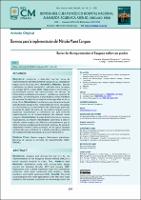| dc.contributor.author | Matassini Eyzaguirre, Silvana M. | |
| dc.contributor.author | Cam Chang, Luis | |
| dc.contributor.author | Fernández Sierra, Carmen | |
| dc.date.accessioned | 2023-05-16T21:23:12Z | |
| dc.date.available | 2023-05-16T21:23:12Z | |
| dc.date.issued | 2021-12-13 | |
| dc.identifier.citation | Revista del Cuerpo Médico Hospital Nacional Almanzor Aguinaga Asenjo. 2021:14 (3). | es_PE |
| dc.identifier.issn | 2227-4731 | |
| dc.identifier.uri | https://hdl.handle.net/20.500.12959/3673 | |
| dc.description.abstract | Obejtivo: Analizar y discutir las barreras de implementación del Método Mamá Canguro en un hospital del
seguro social de Lima, Perú. Material y Métodos. Estudio
cualitativo con diseño etnográfico realizado entre los meses
de octubre 2019 y enero 2020. Observación y entrevistas a
profundidad fueron las herramientas de recojo de
información empleadas con madres, familiares y personal de
salud (PS). Se entrevistaron a diez madres y ocho miembros
del personal de salud de un hospital de la seguridad social en
Lima, Perú. Resultados: Las barreras para la aplicación del
método mamá canguro más resaltantes fueron las vinculadas
al trato humano y al conocimiento del método por parte del
personal de salud. De parte de las madres canguro son los
aspectos económicos y familiares los que influyen
negativamente en el involucramiento del método mamá
canguro. Conclusiones: A pesar de la limitación de recursos
hospitalarios, las madres manifestaron que llevar a cabo el
método mamá canguro se dificulta principalmente por la
débil relación con algunos miembros del personal de salud. Es
importante invertir, como prioridad, en el capital humano
involucrado para contribuir al traslado sostenible y efectivo
del cuidado del bebé prematuro a un nivel domiciliario. | es_PE |
| dc.description.abstract | Objetives: Analyse and discuss the barriers to the
implementation of the Kangaroo Mother Method (KMC) in a
social security hospital in Lima, Peru. Material and
Methods: Qualitative study with ethnographic design
carried out between October 2019 and January 2020.
Observation and in-depth interviews were the information
collection tools used, conducted with mothers, family
members, and health personnel (HCP). Results: The most
outstanding barriers to the application of the KMC were those
related to the humane treatment and knowledge about the KMC by health personnel. On the part of kangaroo mothers, it is the economic and family aspects that negatively influence
their involvement in the MMC. Conclusions: Despite the limitation of hospital resources, the mothers stated that carrying
out the KMC is challenging mainly due to the weak relationship with some members of the health personnel. It is important
to invest, as a priority, in the human capital involved to contribute to the sustainable transfer and effective care of the
premature baby at a household level. | es_PE |
| dc.format | application/pdf | es_PE |
| dc.language.iso | spa | es_PE |
| dc.publisher | Seguro Social de Salud (EsSalud) | es_PE |
| dc.relation.uri | http://cmhnaaa.org.pe/ojs/index.php/rcmhnaaa/article/view/1248 | es_PE |
| dc.rights | info:eu-repo/semantics/openAccess | es_PE |
| dc.rights.uri | https://creativecommons.org/licenses/by-nc-sa/4.0/ | es_PE |
| dc.subject | Madre canguro | es_PE |
| dc.subject | Nacimiento prematuro | es_PE |
| dc.subject | Barreras de acceso a servicios de salud | es_PE |
| dc.subject | Kangaroo mother-care method | es_PE |
| dc.subject | Premature birth | es_PE |
| dc.subject | Barriers to access of health services | es_PE |
| dc.title | Barreras para la implementación del Método Mamá Canguro | es_PE |
| dc.title.alternative | Barriers for the implementation of Kangaroo mother care practice | es_PE |
| dc.type | info:eu-repo/semantics/article | es_PE |
| dc.subject.ocde | https://purl.org/pe-repo/ocde/ford#3.02.03 | es_PE |
| dc.subject.ocde | https://purl.org/pe-repo/ocde/ford#3.02.02 | es_PE |
| dc.identifier.doi | https://doi.org/10.35434/rcmhnaaa.2021.143.1248 | |






